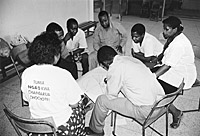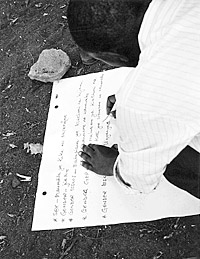


Mme Gabrielle Rajoelison, chef du Département des eaux et forêts et chargée de cours/chercheur au Département d'écologie forestière et de sylviculture de l'Université d'Antananarivo (Madagascar) a passé trois semaines au Service des femmes dans le développement de la FAO. Lors de son séjour, Mme Rajoelison a participé avec des scientifiques de haut niveau de la FAO à la formulation d'une stratégie destinée à intégrer les questions concernant les sexospécificités au coeur du développement dans ce pays à faible revenu et à déficit vivrier.
La Sra. Gabrielle Rajoelison, Jefe del Departamento de Silvicultura y Aguas y Profesora/Investigadora en Ecología Forestal y Silvicultura, Universidad de Antananarivo, Madagascar, llevó a cabo una misión de tres semanas en el Servicio de la Mujer en el Desarrollo (FAO). Durante su misión colaboró con científicos superiores de la FAO para formular una estrategia a fin de introducir el género como aspecto dominante en el ámbito del desarrollo de su país, de bajos ingresos y con déficit de alimentos.
![]()
Over the past three decades, there has been a growing understanding of the linkage between gender issues and general development problems, such as poverty, lack of political power and environmental degradation. There is increasing recognition that wider social and economic and political imbalances that affect women and men contribute to sexual inequality in the public and private spheres.
Visiting expert Gabrielle Rajoelison, head of the Department of Forestry and Water and lecturer/researcher in Forest Ecology and Silviculture at the University of Antananarivo, Madagascar, completed a three-week assignment with FAO's Women in Development Service (SDWW). During her assignment, Rajoelison collaborated with senior scientists at FAO to formulate a strategy to mainstream gender within this low-income food-deficit country's development. Women are conspicuous by their absence from public life in Madagascar, and there is a need to develop a national capacity in gender analysis in order to mainstream it within Madagascar's development policies, programmes and projects.
of Forestry and Water and lecturer/researcher in Forest Ecology and Silviculture at the University of Antananarivo, Madagascar, completed a three-week assignment with FAO's Women in Development Service (SDWW). During her assignment, Rajoelison collaborated with senior scientists at FAO to formulate a strategy to mainstream gender within this low-income food-deficit country's development. Women are conspicuous by their absence from public life in Madagascar, and there is a need to develop a national capacity in gender analysis in order to mainstream it within Madagascar's development policies, programmes and projects.
The Socioeconomic and Gender Analysis Programme (SEAGA) was initiated in 1993 at FAO in response to the crucial importance of building gender analysis capacities at the regional, national and local levels on the basis of participation and equality. SEAGA recognizes the interconnectedness of field-level development issues and a range of political, economic and social factors operating at the intermediate and macro levels.
During her assignment at headquarters, Rajoelison familiarized herself with the SEAGA methodology and tools, which include training manuals, sector guides, training of trainers and reference and multimedia materials, as well as a CD-ROM, an information kit and a brochure. Together with FAO staff, she selected appropriate materials to achieve the objective of gender mainstreaming in Madagascar's development projects and also formulated a strategy to integrate SEAGA within the country's higher education system and its application by extension workers.
which include training manuals, sector guides, training of trainers and reference and multimedia materials, as well as a CD-ROM, an information kit and a brochure. Together with FAO staff, she selected appropriate materials to achieve the objective of gender mainstreaming in Madagascar's development projects and also formulated a strategy to integrate SEAGA within the country's higher education system and its application by extension workers.
Rajoelison recommended that a "gender network" should be formally established in key institutions within Madagascar's university system. She also recommended that selected staff members and students, non-governmental organizations and government personnel should be trained in SEAGA's methodology and materials through briefing sessions and workshops given by a national team of trainers. FAO will provide the material for the information and training sessions and will assist in training planning as well as in the creation of a trainers' team.